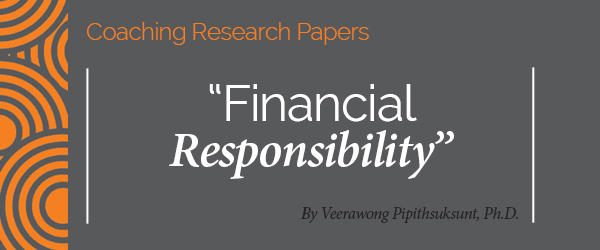A Research Paper created by Veerawong Pipithsuksunt
(Leadership Coach, VIETNAM)
Employees in Thailand have been faced with the debt problem for more than many decades. According to Thai National Statistics institute, it said that 60.9% of employees in Thailand had debts which may happen from improper expenses such as buying luxury and trendy goods.
Nowadays, while we have many researches about this issues, but it doesn’t seem to help us from suffering the debts. Knowledge about debt is not enough for solving these issues. And, debt seems to be increased continuously, which made many negative effects on many peoples such as selling a home and quitting a job.
Debt problem does really like the drugs or many addictive products that cause peoples to addict. They tend to spend more than they have. And, it makes spiral downward in their life.
Kim, J., Garman E. T. & Sorhaindo B. (2003) showed that there were no significant and direct effects of credit counseling on financial behaviors, financial well-being, or health. Eighteen months may be too short to achieve significant changes in their financial well-being and health. Typical debt management program clients have to stay in the program for 3 to 5 years to repay their liabilities. Sixty-three percent of the participants reported that they started to accumulate unsecured debts more than five years earlier. The impacts of credit counseling on financial behaviors, financial well-being, and health may take more time than 18 months.
Last, we need to have some tools or mechanisms for support these peoples and recover them to normal situation in term of personal financial wellness.
Statement of Problem
To identify the opportunities from coaching for support these peoples who face with the debt problem.
Significance of the Study
This research aimed for supporting people who have struggled in personal financial area of their life. We cannot deny that financial is the most important part of our life. And, if we cannot manage it right, it will manage us badly.
Research Questions
- What are the common characteristics for the major group of people who have a debt?
- What are the conditions that make them have a debt?
- What are the behaviors and attitudes that make them have a debt?
- What are the root causes that make them have a debt?
- How can coaching support employees in Thailand to improve their financial responsibility?
Data Methodology
We will interview at least 10 persons in Thailand, who have faced with debt problems. And, also, we will do a panel group of experts to discuss about these issues.
Results
From the interview, the high level of employees in organization received higher salary and welfare more than low level of employees, but they tend to spend more. There are no differences between employees who worked with public or private organizations. Gender differences are not shown. Then, we found that they are no major group of people who have a debt in term of common characteristics.
They said that they tend to make a debt without avoidance. It is because they have to spend their children tuition, and many necessary expenses. Some of them said that they have to help their parents because they are too old for working. It is very clear that the people who have debt depends on the number of peoples that they are responsible to raising and caring.
More, the financial institutes have many campaigns to promote credit card. They tend to apply for credit card in many financial institutes, and pay minimum amount of interests for each month.
They have many noticeable behaviors that cause them to have a debt. They are spending too much money on unnecessary things such as new mobile phone. They tend to buy a house and a car without plan. They have a child without plan. Unexpected expenses make them a debt, and it cannot easily recover from negative status.
We notice their attitudes obviously that make them a debt. They thought they are spending like other peoples. It is right to spend the money in the future despite of paying huge amount of interest in total.
